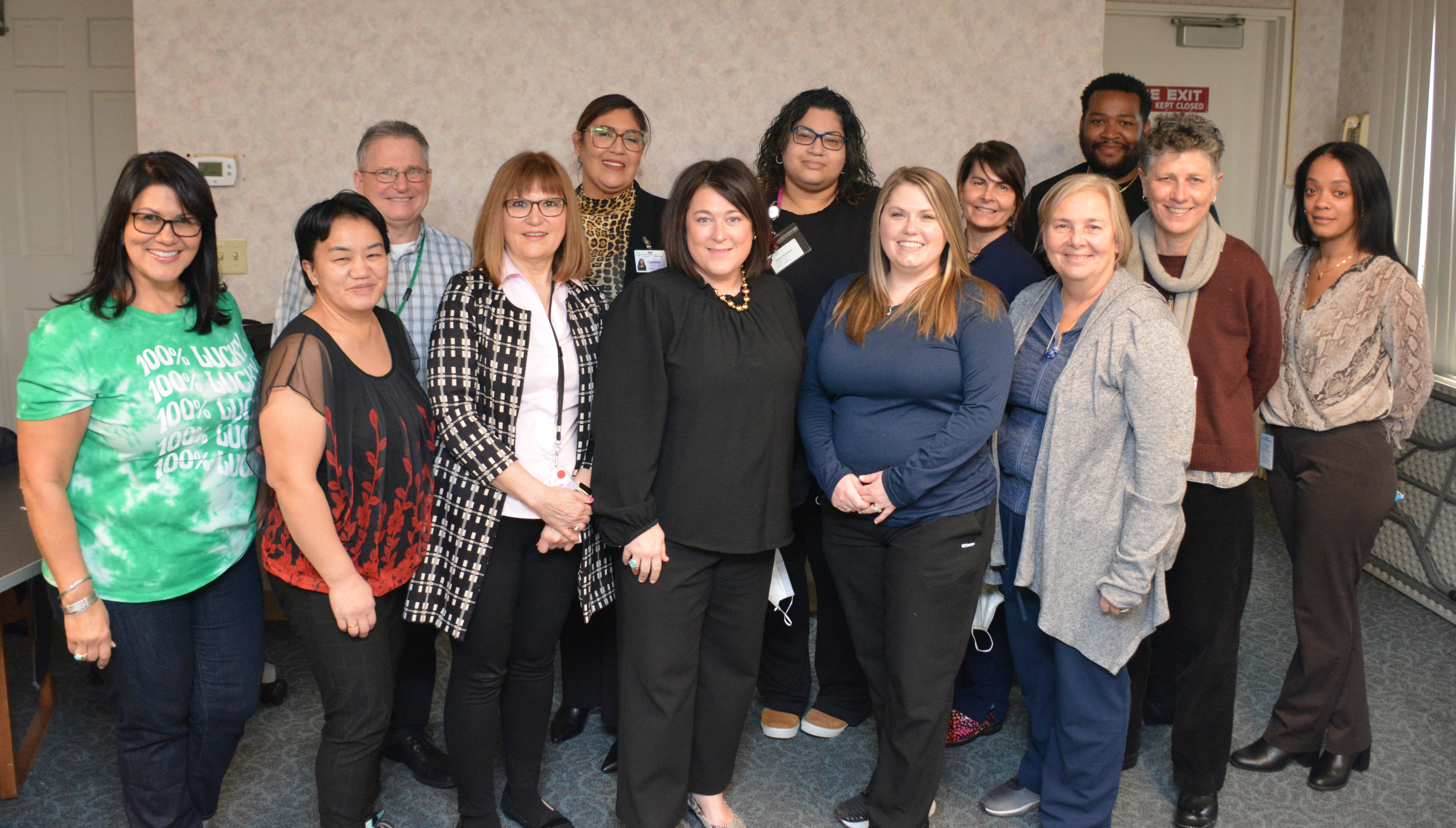Health Care for the Homeless
A Legacy of Care Since 1983
The Mercy Healthcare for the Homeless (HCH) program has been a steadfast advocate for the health and well-being of homeless individuals in Western Massachusetts for over four decades. Our commitment to providing essential healthcare services to this vulnerable population has remained unwavering throughout the years.
Comprehensive Services
Our program offers a wide range of services, including:
-
On-site primary care: Provided at shelters, soup kitchens, job placement sites, and transitional programs throughout Hampden, Franklin, and Hampshire counties.
-
24-hour emergency coverage: Back-up arrangements ensure continuous access to care.
-
Specialized services: Our team includes nurses, nurse practitioners, a medical director, case managers, administrative staff, physicians, psychiatrists, and an executive director.
-
Volunteer physician support: A dedicated corps of volunteer physicians provides additional medical services.
-
Street outreach: The Street Outreach team extends our services to the most vulnerable homeless individuals.
Partnerships and Support
-
Mercy Medical Center: Our program is supported by Mercy Medical Center, which provides laboratory, X-ray, and inpatient services.
-
Government grants: Funding from the Stewart B. McKinney Homeless Assistance Act has been crucial to our growth and sustainability.
-
Community collaborations: We work closely with organizations such as Mental Health Associates of Greater Springfield, Alcohol and Drug Services of Western MA, and the Live Well Springfield Collaborative.
The Live Well Springfield Collaborative
The Live Well Springfield Collaborative brings together over 30 organizations working to build and sustain a culture of health in Springfield. They focus on transforming the community through policy, systems, and environmental change efforts.
Partners of the Collaborative:
-
Martin Luther King Jr Family Services
-
Pioneer Valley Planning Commission
-
Public Health Institute of Western Mass
-
Springfield Food Policy Council
-
Springfield Public Schools
-
Square One
-
Wayfinders
413Cares
413Cares is an online community resource database that provides residents in Western Massachusetts with access to critical information, resources, and referrals to community-serving organizations.
Resources available on 413Cares:
-
Food and Nutrition
-
Healthcare
-
Housing
-
Early Education
-
Behavioral Health & Recovery
By working together with these organizations, the Mercy Healthcare for the Homeless program is able to provide even more comprehensive care to the homeless population in Western Massachusetts and contribute to a healthier community.
For more information about the Mercy Healthcare for the Homeless program, please call 413-748-9064.
Together, we are making a positive impact on the lives of those in need.

Mercy Medical Center Supports Healthcare for the Homeless
Mercy Medical Center is the cornerstone of the HCH program, providing laboratory, X-ray and inpatient services to clients. HCH nurse practitioners are credentialed and have on-staff privileges at Mercy Medical Center and the Emergency Department provides back-up during hours when HCH staff are not available.
Street Outreach
To ensure that Mercy's services extend to even the hardest to reach, the Street Outreach team was added in 1998. Supported by a HUD (Housing and Urban Development) grant, the HCH Street team is a joint effort of three organizations, Mental Health Associates of Greater Springfield (MHA), Alcohol and Drug Services of Western MA (ADS) and Mercy HCH. Working on the streets, at the bus terminal, in cemeteries and under bridges, the team searches for the "hangout" spots of the hardest to reach of the homeless population. The goal is to reach those with mental illnesses, who avoid any contact with the mainstream health and social service system and who may never have received services before.
History of the Healthcare for the Homeless Program
The Mercy Healthcare for the Homeless (HCH) program began in 1983 in a Springfield, Massachusetts, soup kitchen, operated by the Sisters of Providence. Arriving with basic medical supplies in the back of her station wagon, Julie Crane, a Sister of Providence, who was also a nurse practitioner, began ministering to the homeless people who frequented the soup kitchen. Obvious abrasions, old wounds and untended coughs were evidence of the lack of basic health care among this population. Not limiting herself to the soup kitchen, Sister quickly extended her ministry to the streets, shelters and even local bars.
In the 1980s the program began to grow with financial support from the Sisters of Providence and the recruitment of additional volunteers. A local foundation awarded a small grant that enabled the program to hire two part-time staff.
In 1987, the Stewart B. McKinney Homeless Assistance Act was passed, reflecting the federal government's growing concern with the growing number of homeless persons residing in cities throughout the country. Mercy HCH, together with two partners, the Springfield Public Health Department and Open Pantry Community Services, Inc., applied for and in 1988 received one of the first grants awarded through the McKinney program. This support allowed Mercy HCH to hire a team of four providers, serving clients at eight sites in Springfield. In 1988, the team cared for about 800 clients, providing just under 2,000 encounters for a comprehensive array of medical needs.
